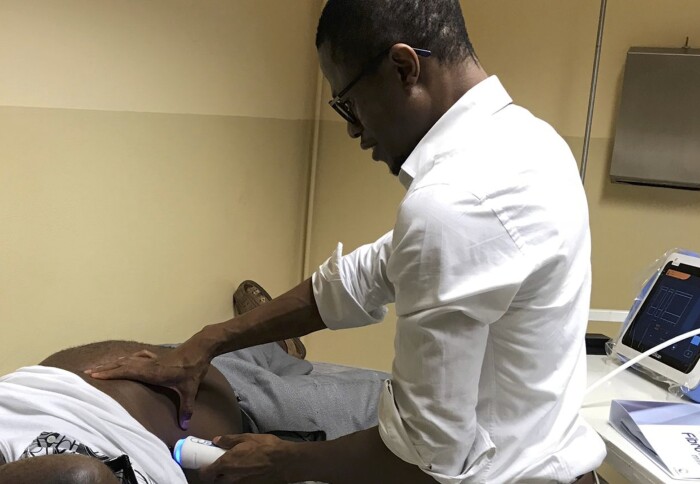Study reveals need for early diagnosis and treatment of liver disease in Africa

Research, published in The Lancet Global Health, highlights the urgent need for interventions & early screening programs for liver disease in Africa.
Researchers from Imperial College London and the Medical Research Council Unit The Gambia at the London School of Hygiene & Tropical Medicine have recently conducted a significant study focusing on patients suffering from cirrhosis and hepatocellular carcinoma (HCC). The investigation also aimed to assess the impact of Tenofovir Disoproxil Fumarate on the survival rates of HBV-infected patients diagnosed with cirrhosis.
"Our study suggests that programmes supporting screening and early diagnosis & treatment of cirrhosis are urgently needed in Africa, where 82 million people live with hepatitis B virus.” Professor Maud Lemoine Head of Digestive Diseases
One of the key findings of the study highlighted the prevalence of HBV infection as the primary cause of HCC and cirrhosis within the Gambian population. The prevalence of viral hepatitis in Africa was found to be a leading factor contributing to various liver-related diseases. The survival rates were reported to be very low, with HCC patients having a median survival time of only 1.5 months and cirrhosis patients having a slightly longer median survival time of 17.1 months.
For patients with cirrhosis who were infected with HBV, the median time between diagnosis and the initiation of Tenofovir treatment was approximately 4.9 months. This delay in treatment initiation raises concerns about the potential impact on patient outcomes.
Chronic liver disease, particularly stemming from viral hepatitis B and C, remains a major cause of premature mortality in sub-Saharan Africa. Despite its prevalence, the region lacks well-established treatment and management programs for cirrhosis and HCC. This study aimed to address this critical knowledge gap and offer insights into the effectiveness of antiviral therapy for HBV-infected patients with cirrhosis.
Highlighting the urgent need for interventions and early screening programs for liver disease in Africa
The research sheds crucial light on the challenges faced by patients with cirrhosis and HCC in the Gambian population, emphasising the urgent need for improved treatment strategies and management programs. By understanding the impact of HBV infection and the potential benefits of antiviral therapy, healthcare professionals can better address liver-related diseases in Africa and work towards improving patient outcomes in the future.
Professor Maud Lemoine, senior author of the study and Head of the Division of Digestive Diseases in the Department of Metabolism, Digestion and Reproduction, said: “Tenofovir, a safe drug now accessible at generic cost widely in Africa, can be a game changer by improving the survival of HBV-infected patients with cirrhosis.”

The WHO called for hepatitis B elimination by 2030 and aims to significantly reduce hepatitis B related mortality. Our study suggests that programmes supporting screening and early diagnosis & treatment of cirrhosis are urgently needed in Africa, where 82 million people live with hepatitis B virus.”
The study was part of the PROLIFICA (Prevention of Liver Fibrosis and Cancer in Africa) program, which aims to address the burden of liver disease in West Africa. The program focuses on understanding liver disease severity, developing simplified diagnostics, and improving management strategies for HBV-infected individuals.
Speaking on the findings, Dr Gibril Ndow, lead author of the study said, “Our results show that antiviral therapy with Tenofovir, which is now widely accessible and affordable, can reduce hepatitis B related mortality in Africa. This calls for urgent and coordinated action to scale up hepatitis B screening and treatment programs in the region.”
These results act as a compelling appeal to healthcare policymakers and stakeholders, urging them to give top priority to research and initiatives focused on preventing, diagnosing, and treating cirrhosis and HCC in sub-Saharan Africa. By implementing appropriate interventions, there is a real potential to reduce the devastating impact of liver diseases and enhance the overall health outcomes of those affected within the region.
The research was supported by funding from EC-FP7 and MRC UKRI.
This article is adapted from materials produced by the MRC Unit The Gambia at the London School of Hygiene & Tropical Medicine.
Clinical characteristics and outcomes of patients with cirrhosis and hepatocellular carcinoma in The Gambia, west Africa: a prospective cohort study. Gibril Ndow, Erwan Vo-Quang, Yusuke Shimakawa, Amie Ceesay, Saydiba Tamba, Harr F Njai, Lamin Bojang, Charlotte Hateley, Yuki Takao, Emmanuel Opoku, Zakary Warsop, Patrick Ingiliz, Prof Umberto D'Alessandro, Isabelle Chemin, Maimuna Mendy, Prof Mark Thursz, Prof Ramou Njie, Prof Maud Lemoine. July 27, 2023 DOI: https://doi.org/10.1016/S2214-109X(23)00263-2
Article text (excluding photos or graphics) © Imperial College London.
Photos and graphics subject to third party copyright used with permission or © Imperial College London.
Reporter
Benjie Coleman
Department of Surgery & Cancer